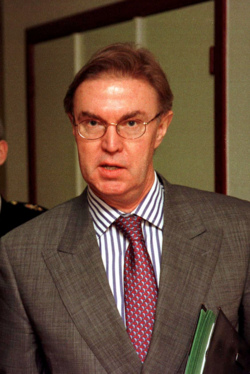Difference between revisions of "Canada/Ambassador/Spain"
m (unstub) |
(tidy, standardize) |
||
| (2 intermediate revisions by 2 users not shown) | |||
| Line 2: | Line 2: | ||
|wikipedia=https://en.wikipedia.org/wiki/Category:Ambassadors_of_Canada_to_Spain | |wikipedia=https://en.wikipedia.org/wiki/Category:Ambassadors_of_Canada_to_Spain | ||
|start=1953 | |start=1953 | ||
| + | |image=David Wright (Canadian).png | ||
| + | |image_caption=Ambassador [[David Wright (Canadian)|David Wright]], later [[Permanent Representative to NATO]]. | ||
|interests= | |interests= | ||
|constitutes=Ambassador to Spain | |constitutes=Ambassador to Spain | ||
| + | |description=The Canadian ambassador to Spain | ||
}} | }} | ||
| + | The '''Canadian Ambassador to Spain''' is [[Canada]]'s highest diplomatic representative to [[Spain]]. | ||
| + | |||
| + | ==Overview== | ||
Canada and Spain established diplomatic relations in 1953. Both nations are members of [[NATO]], the [[Organisation for Economic Co-operation and Development]] and the [[United Nations]]. | Canada and Spain established diplomatic relations in 1953. Both nations are members of [[NATO]], the [[Organisation for Economic Co-operation and Development]] and the [[United Nations]]. | ||
Latest revision as of 01:29, 10 April 2024
(Ambassador to Spain) | |
|---|---|
 Ambassador David Wright, later Permanent Representative to NATO. | |
| Start | 1953 |
| The Canadian ambassador to Spain | |
The Canadian Ambassador to Spain is Canada's highest diplomatic representative to Spain.
Overview
Canada and Spain established diplomatic relations in 1953. Both nations are members of NATO, the Organisation for Economic Co-operation and Development and the United Nations.
In December 1959, both nations eliminated visa requirements for their citizens.
Turbot War
In March 1995, relations between both nations reached an all-time low when a Spanish fishing boat called the "Estai" with a crew of 45 was seized just outside of Canada's Exclusive Economic Zone because the Canadian government accused Spain of overfishing turbots near its waters, triggering the Turbot War (Guerra del fletán in Spanish).[1][2] During the crisis, Spain imposed visas on Canadian citizens visiting Spain and threatened to break diplomatic relations with Canada.[3] Spain began sending Serviola-class patrol boat to protect their trawlers when Canada began to cut the nets of Spanish trawlers fishing in the area.[4] Support from the European Union was split during the crisis, with the United Kingdom and Ireland supporting Canada while mainland Europe and Iceland supported Spain. During negations between Canada and the European Union to resolve the issue, the crew of Estai posted a $500,000 bail and returned to Spain. The crisis was resolved when Canada and the European Union agreed to a deal on April 5. Under this agreement Spain was forced to leave the disputed zone and Canada's right to eject foreign fishing vessels from the area using military force was accepted. Under the deal Canada's own Greenland turbot quota was reduced, and they refunded the $500,000 fine to the owners of the Estai. Since the crisis, Canadian-Spanish relations improved and in 2007, a Memorandum of Understanding on Fisheries Cooperation was signed between both nations.[5]
Office Holders on Wikispooks
| Name | From | To |
|---|---|---|
| Malcolm McKechnie | October 2005 | |
| David Wright (Canadian) | 1994 | 1997 |
References
- ↑ https://www.nytimes.com/1995/03/12/world/canada-and-spain-face-off-over-fishing-zone.html Canada and Spain Face Off Over Fishing Zone
- ↑ https://carleton.ca/ces/eulearning/geography/turbot-war/ Canada, Spain, and the European Union in the Turbot War
- ↑ http://elpais.com/diario/1995/03/14/economia/795135627_850215.html El País: España impone el visado a Canadá y amenaza con romper relaciones diplomáticas (in Spanish)
- ↑ http://britishseafishing.co.uk/the-turbot-war/ The Turbot War
- ↑ https://web.archive.org/web/20160730042726/http://www.dfo-mpo.gc.ca/international/dip-mou-eng.htm